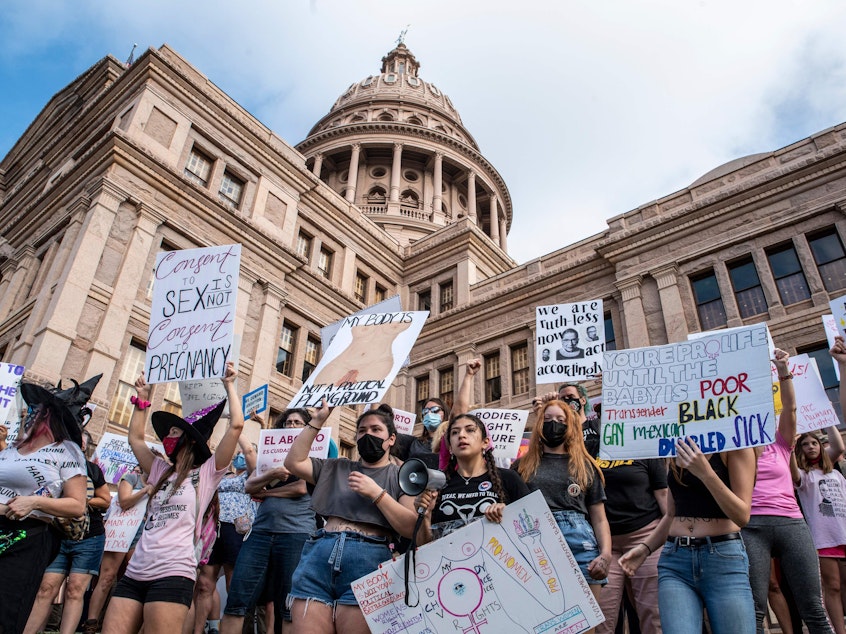A U.S. judge blocks enforcement of Texas' controversial new abortion law

A federal judge has blocked enforcement of Texas' controversial new abortion law, granting an emergency request from the Justice Department.
The department sought the preliminary injunction just days after it sued Texas over its new abortion law. Known as SB 8, the law bans almost all abortions in the state after about six weeks of pregnancy, even in cases of rape, sexual abuse and incest.
Updated October 6, 2021 at 10:50 PM ET
In his 113-page ruling, U.S. District Court Judge Robert Pitman said that from the moment SB 8 went into effect last month, "women have been unlawfully prevented from exercising control over their lives in ways that are protected by the Constitution."
He added: "[O]ther courts may find a way to avoid this conclusion is theirs to decide. This Court will not sanction one more day of this offensive deprivation of such an important right."
Sponsored
U.S. Attorney General Merrick Garland called the court's decision "a victory for women in Texas and for the rule of law."
"It is the foremost responsibility of the Department of Justice to defend the Constitution," Garland said in a statement. "We will continue to protect constitutional rights against all who would seek to undermine them."
Pitman's ruling blocks enforcement of the Texas law on a temporary basis, and it's unclear how long it will be in effect. Texas has already filed notice that it will appeal Pitman's ruling to the 5th U.S. Circuit Court of Appeals, and the state is expected to seek an immediate stay from the circuit court on Wednesday's order.
The DOJ's argument
The Justice Department filed its lawsuit against Texas last month, arguing that SB 8 is unconstitutional. It says the bill violates the Supremacy Clause as well as the equal protection afforded under the 14th Amendment. It also says it violates U.S. Supreme Court precedent.
Sponsored
It also takes aim at the bill's novel means of enforcement: It allows private citizens to bring civil suits against anyone who helps a woman get an abortion, and to collect at least $10,000 in damages if they prevail in court.
The department says the enforcement mechanism is really an unconstitutional attempt to sidestep judicial review to prevent women and providers from challenging the law in federal court.
Judge Pitman agreed in his decision Wednesday night.
"A person's right under the Constitution to choose to obtain an abortion prior to fetal viability is well established," he wrote. "Fully aware that depriving its citizens of this right by direct state action would be flagrantly unconstitutional, the State contrived an unprecedented and transparent statutory scheme to do just that."
When he announced the department's lawsuit, Garland warned that the Texas bill and its enforcement scheme, if allowed to stand, could provide a model for other states to pass a similar law to restrict abortion or other constitutionally protect rights.
Sponsored
On this point as well, Judge Pitman appeared to agree. He said that by stepping in and issuing an injunction now, he could head off such a possibility.
"Had this Court not acted on its sound authority to provide relief to the United States, any number of states could enact legislation that deprives citizens of their constitutional rights, with no legal remedy to challenge that deprivation, without the concern that a federal court would enter an injunction," he wrote.
Texas has defended the constitutionality of SB 8, and had urged the court to deny the federal government's motion and dismiss the case.
Reaction from both sides of the issue
In a statement, the anti-abortion rights group Texas Right to Life called Pitman's decision "wildly broad" but added: "We are confident that the Texas Heartbeat Act will ultimately withstand this legal challenge and succeed where other states' heartbeat bills have not."
Sponsored
Abortion rights groups cheered the ruling.
"While this fight is far from over," said Alexis McGill Johnson, president and CEO of the Planned Parenthood Federation of America, in a statement, "we are hopeful that the court's order blocking S.B. 8 will allow Texas abortion providers to resume services as soon as possible." [Copyright 2021 NPR]



